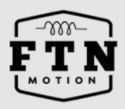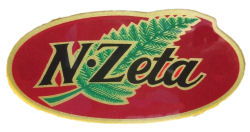


Farmbyke
Johnny Callender and Jack Sleep of Waitara designed and built a motorcycle named the Mountain Goat in 1963. The firm went on to build trailers and sidecars along with a new motorcycle, the Farmbyke. Powered by Kawasaki and Suzuki engines of 80 to 120cc, these proved very popular in the 1970s.
Sources: collection.pukeariki.com, stuff.co.nz, et al
Farmtrike
Manufactured by Astill Engineeringin Te Aroha.
Known as the "Farmtrike Landcat" it was powered by a Honda engine.
More information: collection.motat.nz

FTN-Motion
"The first Streetdog was built in a garage by Kiwi founders Luke and Kendall. Today, a team of engineers and technicians craft them in our Hamilton workshop."
The first machines were sold in 2020.
Website: ftnmotion.com
FB: fb.com/ftnmotion
FX Bikes
Advertised lightweight offroad machines with 70cc engines from 2005 to about 2011.
PO Box 130065, Christchurch City, New Zealand
Website: fxbikes.com ✝
Gnat
Built in Christchurch, the three-wheeled powered tricycle that produced between 1965 and 1973 by Cameron Lewis.
The Gnat was designed with lower pressure tyres to gain traction on rough ground, making the vehicle a precursor to All Terrain Vehicles (ATVs). They were able to seat two people, with an empty weight of 145kg and a max speed of 32 km/h. The Mk 1 was powered by a 2-stroke Villiers engine, while later models were powered by a Honda industrial engines, and the Mk3 with a 9hp Briggs & Stratton engine with an automotive gearbox. They used tiller steering.
They became popular in New Zealand with farmers, hunters and fishermen because of their off-road abilities. Their success led to NASA contacting Cameron Lewis & Company Ltd. to purchase one for possible use in space exploration and, for a time, the company diverted efforts into this development. Production of Gnats eventually ceased because the manufacturing company were challenged by lack of access to testing facilities, as well the limitations brought about by batch production.
Sources: collection.motat.nz; digitalnz.org
Kingsbeer Sidecars
J. Kingsbeer Sidecars, Feilding NZ
Carriage and Motor Car Painter and Cycle Side-car Builder
Kingsbeer's Motor Cycle Sidecars.
From almost every part of New Zealand orders are sent to Mr. J. A. Kingsbeer, of Feilding, for his popular coachbuilt sidecars, and since the first introduction of these in 1912, Mr. Kingsbeer's trade in them has trebled. Those who have occasion to use a sidecar will readily tell you that the coach-built article as supplied by Kingsbeer is neater, cheaper, stronger, and more reliable in every respect than those made by the bush carpenter, and another thing — is it safe to ride in just any sort of a construction?
For your life's sake get a coach-built Kingsbeer, one constructed and designed by a qualified tradesman, and which, for comfort and excellence, cannot be beaten. If your cycle agent does not stock the Kingsbeer, or won't get you one, write direct to Feilding. For price and finish they stand alone. Eight different designs to select from. Wind screens, hoods, and all equipment, supplied.
Write J. A. Kingsbeer, proprietor, Carriage Works, Feilding, for prices and all particulars.
Evening Post, Volume XCII, Issue 107, 2 November 1916, Page 15 (paperspast.natlib.govt.nz)
Monsta Trikes
Manufactured by Gary Butler
Monsta Trikes Aotearoa Pty Limited
20 Constable Street, Waiukus
Company registered Sept 24th 1999
Sources: ozebook.com, et al.
Mountaineer
An early belt-driven motorcycle with a twin-cylinder engine. 'The Mountaineer' is inscribed on the petrol tank. It may have been sold by Gordon Hughan Ltd of Carterton, NZ.
Source: digitalnz.org
N.B. This may be an import, but the appearance does not match any of the available photos of the two British manufacturers who used the "Mountaineer" name, Marsdens, and Rex of 1902. Furthermore, a forum post mentioned "NZ Mountaineer of 1909". See also Mountaineer Marques.
Munro
New Zealand's Burt Munro of Invercargill is legendary, the stuff of which movies are made. So they made two, one of which is The World's Fastest Indian.
Herbert James "Burt" Munro was born in Edendale, New Zealand, on March 25, 1899. At the age of 21 he bought an Indian Scout, and began modifying it in 1926. In 1967, at the age of 68, he took his now much modified machine to Bonneville Salt Flats and achieved a world record.
In total Munro took 14 trips to Bonneville and achieved 3 world records, one of which still stands.
"You're kidding! No way! He didn't! Holy cow!" - Burt Munro at Wikipedia

NZeta
Manufactured by JNZ Manufacturing Ltd at 22 England St, Ponsonby, Auckland, 1961 to 1963.
Assembled using parts imported from CZ by Lorenz Von Sommeruga of Kawasaki Motors, along with locally made exhausts and other components. NZ import regulations at the time required that 25% of the vehicle should be locally produced. For the NZeta this included local body welding work, chrome plating and the fabrication of steel components.
The scooter is a two-seater with a monocoque chassis. Powered by a 175cc Jawa two-stroke it has a maximum speed of 75km per hour. It was priced at £219.
Based on the Cezeta 501 and 502 models, some 4000 scooters were built over the three years of production. The factory closed when demand for such scooters dropped off.
Sources: nzeta.com, collection.motat.nz
Pearse 1912
Solar (NZ)
It seems likely that Solar NZ rebranded Sun motorcycles. See Sun Motorcycles
Stella
Stella Cycle Works, C. T. Jessep and Co., of Temuka, (near Timaru), was established in July 1899 by Charles Jessep and Raymond Every. In October 1901 they produced New Zealand's first motorcycle, powered by a 1¼ h.p. Minerva engine which had been imported by A.G. Healing.
"On July 10,1901 A.G. Healing & Co. of Christchurch, reported that they had ordered a motor cycle to the order of a client..."
"The first arrival of a class of bicycle which in a few years promises to become as common as the modern safety , made its debut in public on Monday week at the Canterbury Athletic and Cycling Club's evening carnival at Lancaster Park. The motor is a 'Minerva', constructed after the De Dion pattern, and was imported by A.G. Healing and Co. to the order of Messrs Jessop and Every, of the Stella Cycle Works, Temuka."
~ The Wheelman
See also Wood of Timaru .
Article on the Stella and Wood. Well worthwhile. bsaoc.co.nz/new-zealands-first-successful-motorcycle/ ✝ (available at Wayback)
Sources: en.wikipedia.org, Beaded Wheels.
Stewart
Manufactured by Jack Stewart of Marua Rd, Auckland.
Stewart, who had lost his leg in a motorcycle accident, built around 100 of these rather octagonal scooters in the years 1959 to 1963.
Sources: teara.govt.nz, et al
Stokell
Built by the brothers Clement and Gerald Stokell of Shand's Road, Hornby, Canterbury in the early 1900s.
Their motorcycles were fitted with their own engine, initially an OHV but due to ongoing mechanical problems reverted to SV. A collection of glass-plate negatives of their work includes three images of sidecars (one a two-seater) which they built.
The brothers were both keen fishermen, and Gerald Stokell became an ichthyologist who wrote many papers. His 1955 book on NZ freshwater fish was the standard work on the subject. He was what we would now call a tree-hugger, and did not endear himself to the more conservative sector of academia.
Sources: Beaded Wheels, teara.govt.nz, et al
Wood & Co 1901-03